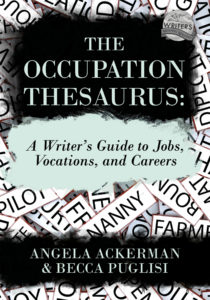
In my twenty-plus years of teaching fiction techniques, I have only recommended a handful of books to my students and clients. Those include:
- Dwight Swain’s Techniques of the Selling Writer
- Jane Friedman’s The Business of Being a Writer
- The Thesaurus Series of seven books by Angela Ackerman and Becca Puglisi, the co-founders of Writers Helping Writers.
I now recommend Angela and Becca’s eighth book, another jewel in their series. The title explains the subject: The Occupation Thesaurus: A Writer’s Guide to Jobs, Vocations, and Careers.
As writers, our primary goal is to create believable, sympathetic, fully engaging characters. To reach that goal, we can use the OCCUPATION THESAURUS to add layers of flesh to our characters’ bones.
How?
Through their occupations and vocations, characters will gain depth and seem more alive.
Why?
In real life, our professions and vocations identify, label, and define us as people. Likewise, in fiction, professions and vocations can identify, label, and define your characters to magnify their appearances on paper as living, breathing story-people.
Too, through the judicious selection of your characters’ professions and vocations, you can insert logic into their thoughts and actions, and emotion into their reactions to story situations.
Angela and Becca explained it best when they wrote: “If we choose [characters’] jobs thoughtfully, readers will have a better understanding of who they are, what skills they possess, and their motivations and priorities. Not only do jobs provide valuable characterization indicators, they tie into the plot itself, providing characters with the abilities and knowledge they’ll need to succeed or by creating obstacles to hinder them along the way. A well-chosen occupation can strengthen your story on many levels . . .”
The authors begin their occupation thesaurus with instructive essays that serious writers should read, carefully, since each one is a mini-writing lesson. The topics are:
- motivations behind career choice
- careers that characterize
- jobs as sources of tension and conflict
- jobs that support story structure and character arc
- vocations as thematic devices.
The mini-lessons preface treatments of 124 professions, in alphabetical order from Actor to Yoga Instructor.
As an example of the authors’ thoroughness, consider their entry for firefighter.
If this thesaurus had been available when I wrote my last mystery, I’d have reduced my hours of research to minutes by going to these entries . . .
- Actor
- clergy member
- coroner
- corrections officer
- crime scene cleaner
- emergency dispatcher
- landscape designer
- novelist
- police officer
- professor
- reporter
Believe me, the Occupation Thesaurus would have saved me weeks or perhaps months of research time about my characters’ jobs and pastimes.
Angela and Becca closed their useful writing tool with appendices: Appendix A Occupation Speed Dating; and Appendix B Career Assessment. They also supplied additional resources for further research.
Without question, the Occupation Thesaurus is a convenient, readable book for writers who wish to add flesh to bones.
I am honored you recommend our books, Maureen, and so happy this newest has been what you hoped it would be. There are so many facets of a character that will yield terrific information that can deepen the story, and jobs, wow. So much insight can be gathered by knowing what a character does and why. We enjoyed exploring this area and hope it’s helpful to writers! Thank you so much for the great review!